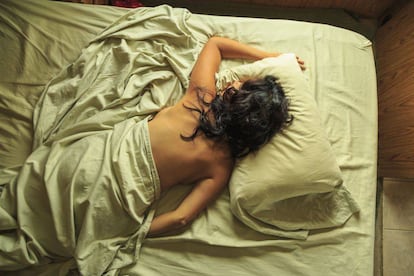How to sleep in the Spanish heat
A few simple tricks for surviving those sweaty summer nights – no air con required

Ciudad Real, central Spain, July 17, 11pm: outside it’s 32.8ºC, according to the AEMET Spanish state meteorological agency. At that temperature the bed sheets cling, pajamas are too heavy, and cool air is notable by its absence. It’s impossible to sleep. Your first reaction is to turn on the air con, if you have it. But often it’s not worth the cost to have it running the whole night, so you decide to turn it off again.
But is it possible to sleep coolly in the Spanish summer without air conditioning? Tradition says yes. Ancient Egyptians used to moisten their bedclothes to sleep better and combat heatwaves, which pose a serious risk to public health. According to the results of a scientific study carried out by the Spanish National Research Council, mortality rates for those aged over 75 increase 20.1% for each degree that the maximum daily temperature rises above 36ºC.
Direct a fan toward the windows to prevent the heat coming through
Our ancestors have passed down to us a long legacy of tricks for staying cool. You can sleep under cotton sheets, for example, which aid perspiration. At the same time you can also put your sheets in the fridge or freezer inside a plastic bag for a few minutes before sleeping – they won’t stay cool the whole night, but it will be long enough for you to fall asleep – or fill a hot water bottle with cold water to cool down your bed. Here are a few more suggestions.
1. Be creative. Come up with methods to stop hot air from entering the room. For instance, point a fan toward the windows, or place a bowl full of ice or very cold water in front of the fan to cool the air further. A damp sheet placed over the window also helps.
2. Wear light pajamas. That’s the advice from the US Centers for Disease Control and Prevention (CDC), though you can also sleep naked if you like. It’s a question of preference. According to a study by the Association of American Cotton Producers Cotton USA carried out in the UK, 57% of people who sleep naked are happier in their relationship with their partner.
3. Apply compresses dipped in lukewarm water on parts of the body most sensitive to heat, such as the neck, elbows, ankles and the backs of the knees. The contact with cool water has a refrigerating effect that triggers a narrowing of the blood vessels, heating up the skin. In turn, the heat cools you down as a result of the difference in the surrounding temperature, explains the CDC.
Over half of people who sleep naked are happier in their relationship with their partner
4. Sleep alone. It’s the best thing to stay cool. Sleeping alongside someone else increases your body temperature and makes the bedclothes cling, explains dormir.org.es, a website devoted to sleep problems. What’s more, doing so at floor level will make you even cooler as hot air tends to rise.
5. Shower in warm water to reduce your body temperature. This is a good tip for feeling fresh and clean. Many people say that, even though the shock of a cold shower produces an instant feeling of coolness, it reactivates your body and energy consumption, which makes you feel the heat more quickly afterwards than if you had showed in warm water, explains the Biological Health Institute. Also, be sure to keep your feet cool as heat enters the body here. Washing them before you turn in for the night or sleeping with them outside the bed are two good tips.
6. Eat salad for dinner. Avoid big meals and hot dishes such as stews, soups and roast chicken. These force the body to produce more heat in order to digest them. A yogurt, salad or that Spanish summer favorite, cold gazpacho, are perfect for summer nights. And don’t forget to drink plenty of water, the WHO says: the body uses it to get rid of heat.
7. Turn off all lights and electronic gadgets completely. Putting them on standby is not enough: they go on using energy and giving off heat, according to the International Energy Agency – between 5% and 10% of what they would use when switched on. Also: replace incandescent light bulbs with compact fluorescent ones, which produce the same amount of light but use a fifth of the energy and give off less heat, according to the emergencies center in Arlington, Virginia.
Lastly, if you are able to sleep out in the open air, do so. Set up a camp on the roof or head out into the country to sleep close to a place next to water (the moisture in the air has a cooling effect), turning a night of stifling heat into one of adventure.
This article was originally published in 2014.
Tu suscripción se está usando en otro dispositivo
¿Quieres añadir otro usuario a tu suscripción?
Si continúas leyendo en este dispositivo, no se podrá leer en el otro.
FlechaTu suscripción se está usando en otro dispositivo y solo puedes acceder a EL PAÍS desde un dispositivo a la vez.
Si quieres compartir tu cuenta, cambia tu suscripción a la modalidad Premium, así podrás añadir otro usuario. Cada uno accederá con su propia cuenta de email, lo que os permitirá personalizar vuestra experiencia en EL PAÍS.
¿Tienes una suscripción de empresa? Accede aquí para contratar más cuentas.
En el caso de no saber quién está usando tu cuenta, te recomendamos cambiar tu contraseña aquí.
Si decides continuar compartiendo tu cuenta, este mensaje se mostrará en tu dispositivo y en el de la otra persona que está usando tu cuenta de forma indefinida, afectando a tu experiencia de lectura. Puedes consultar aquí los términos y condiciones de la suscripción digital.









































